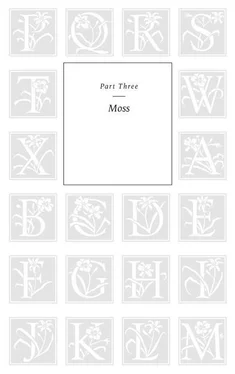Vanessa Diffenbaugh - The Language of Flowers
Здесь есть возможность читать онлайн «Vanessa Diffenbaugh - The Language of Flowers» весь текст электронной книги совершенно бесплатно (целиком полную версию без сокращений). В некоторых случаях можно слушать аудио, скачать через торрент в формате fb2 и присутствует краткое содержание. Жанр: Старинная литература, на английском языке. Описание произведения, (предисловие) а так же отзывы посетителей доступны на портале библиотеки ЛибКат.
- Название:The Language of Flowers
- Автор:
- Жанр:
- Год:неизвестен
- ISBN:нет данных
- Рейтинг книги:4 / 5. Голосов: 1
-
Избранное:Добавить в избранное
- Отзывы:
-
Ваша оценка:
- 80
- 1
- 2
- 3
- 4
- 5
The Language of Flowers: краткое содержание, описание и аннотация
Предлагаем к чтению аннотацию, описание, краткое содержание или предисловие (зависит от того, что написал сам автор книги «The Language of Flowers»). Если вы не нашли необходимую информацию о книге — напишите в комментариях, мы постараемся отыскать её.
The Language of Flowers — читать онлайн бесплатно полную книгу (весь текст) целиком
Ниже представлен текст книги, разбитый по страницам. Система сохранения места последней прочитанной страницы, позволяет с удобством читать онлайн бесплатно книгу «The Language of Flowers», без необходимости каждый раз заново искать на чём Вы остановились. Поставьте закладку, и сможете в любой момент перейти на страницу, на которой закончили чтение.
Интервал:
Закладка:
From the kitchen we walked through a swinging door to the dining room. The table had been pushed to the side and a sleeping bag was spread out on the wood floor. I recognized Grant’s sweatshirt and balled socks beside it.
“When you had evicted me from my own home,” he said, smiling and pointing to the pile.
“Don’t you have a bedroom here?”
Grant nodded. “I haven’t slept there for a decade, though,” he said. “To tell you the truth, I’ve only been upstairs once since my mother died.”
The stairs loomed on my left, a wide wooden banister curving up the side of the room. Grant took a step toward them.
“Come on,” he said. “There’s something I want to show you.” At the top of the stairs we came to a long hall, with doors shut on both sides of the corridor. The hallway ended in front of five steps. We walked up and ducked through a low door.
The small room was hotter than the rest of the house, and filled with the smell of dust and dried paint. I knew before locating the gabled, boarded-up window that we were in Catherine’s studio. When my eyes adjusted to the light, I took in the paneled walls, the long drafting table, and the shelves of art supplies. Half-empty glass jars of purple paint lined the top shelf, paintbrushes frozen in hard pools of lavender and periwinkle. A string circling the room displayed drawings—large, intricately rendered flowers in graphite and charcoal—hung with wooden clothespins.
“My mother was an artist,” Grant said, gesturing to the work. “She spent hours of every day up here. For most of my life, she drew only flowers: rare ones, tropical ones, or short-blooming, delicate ones. She had a fear of not having the right flower to express what she wanted to say at any given moment.”
He led me to an oak file cabinet in the corner of the room and opened the middle drawer. It was labeled L–Q . Every file was marked with a plant name, and each held a file folder with a single drawing: parsley, passionflower, peppermint, periwinkle, pineapple, and pink. He thumbed through the P ’s until he got to poplar, white. He withdrew the file folder and opened it; it was empty. The drawing was in the blue room, still wrapped in a silk ribbon with the inked day and time of our first date.
Grant closed the drawer and opened another, looking through the files until he found a drawing of a cherry blossom. He placed it on the empty drafting table and disappeared through the door.
I sat down, admiring the work. The lines were quick, confident, the shadows deep and complex. The blossom filled the entire paper, and its beauty was nearly overwhelming. I bit my lip.
Grant returned, watching my expression as I studied the paper. “Definition?” he asked.
“Good education,” I said.
He shook his head. “ Impermanence . The beauty and transience of life.”
This time, he was right. I nodded.
Grant held up a hammer he had retrieved and pried the board off the window. Light flooded through the broken glass and onto the tabletop like a spotlight. He placed the drawing in the rectangles of light and sat on the edge of the table. “Shoot,” he said, caressing first the camera and then my body beneath it.
He watched as I extracted the camera from its case and turned to the image. I shot from every angle: standing on the floor, on a chair, and then in front of the window, blocking the harsh light. I adjusted the shutter speed and the focus. Grant’s eyes were on my fingers, my face, and my feet crouched on the tabletop. I went through an entire roll. His eyes did not waver as I loaded a second roll and then a third. My skin lifted under his gaze as if the surface of my body were reaching toward him without the permission of my mind.
When I was done, I returned the drawing to the file folder. The next day I would have the film developed, and my dictionary would be complete. I turned the camera to where Grant sat, unmoving, on the table, and studied his face through the viewfinder.
Sunlight illuminated his profile. Circling, I captured his face in light and shadow. The camera clicked as I walked around him, starting at the top of his head and following his hairline down to the collar of his shirt. I rolled up his sleeves and photographed his forearms, the tight, protruding muscle in his wrist, his thick fingers and dirt-filled fingernails. I took off his shoes and shot the bottoms of his feet. When I ran out of film, I took off the camera.
I unbuttoned my blouse and took it off, too.
The bumps disappeared from the skin of my arms and appeared on Grant’s. I climbed onto the table.
He folded his feet under him and moved to face me, then pressed his hands flat onto my stomach and held them there. His fingers lifted and fell as I breathed deep into my belly. My own fingers, clutching the edge of the table, were white.
He moved his hands around my back to my bra, unhooking it gently, one clasp at a time. Peeling my fingers from the tabletop, he slipped the bra off one arm, then the other. I reached for the table’s edge again, squeezing as if trying to maintain balance on a rocking boat.
“Are you sure?” he asked.
I nodded.
He lay me down on the table, supporting my head as it eased onto the hard surface. He removed the rest of my clothes, and then his own.
Lying down next to me, Grant began to kiss my face. I turned my head toward the window, afraid I would be repulsed by his nudity. The only adult I had ever seen naked was Mother Ruby, and the image of her wet, hanging flesh had plagued me for months afterward.
Grant’s fingers traveled my body with skill. He took as much care with me as he would have with a delicate sapling, and I tried to focus on his touch, the warmth he pulled to the surface of my skin, the weaving of our bodies together. He wanted me, and I knew he had wanted me for a long time. But directly below the window was the rose garden, and even as my body responded to his touch, my mind seemed to hover among the plants, thirty feet below. Grant moved on top of me. The rose garden was at the height of its bloom, the flowers open and heavy. I counted and categorized the individual bushes, starting with the reds, navigating up and down the rows: sixteen, from light red to deep scarlet. Grant’s mouth traveled to my ear, open and wet. There were twenty-two pink rosebushes, if I didn’t count the corals separately. Grant began to move quickly, his own pleasure eclipsing his attentiveness, and I closed my eyes at the pain. Behind my eyelids were the white roses, uncounted. I held my breath until Grant rolled off me.
My body turned to face the window, and Grant pressed himself against my back. His heart beat against my spine. I counted the white roses bursting under the setting sun, thirty-seven in all, more than any other color.
I inhaled deeply, my lungs filling with disappointment.
16 .
For three frantic days we left messages for Catherine: Aloe, grief, taped in a row of spikes like a picket fence to her kitchen window; blood-red pansies, think of me , clustered in a tiny glass jar on her front porch; boughs of cypress, mourning , woven between the metal bars of the wrought-iron gate.
But Catherine made no sign of having received them, and gave Elizabeth nothing in return.
17 .
My clothes migrated to Grant’s in the trunk of my car. My shoes followed , then my brown blanket, and finally my blue box. It was everything I owned. I still paid rent to Natalya on the first of every month, and occasionally took naps on my white fur floor after work, but as the summer progressed, I spent less and less time in the blue room.
My flower dictionary was complete. The photograph I had taken of Catherine’s drawing finished my set, and Elizabeth’s flower dictionary and field guide retired to a dusty existence on the top of Grant’s bookshelf. The blue and orange photo boxes sat side by side on the middle shelf, Grant’s alphabetized by flower and mine by meaning. Two or three times a week Grant or I would set the dinner table with flowers or leave a stem of stock on the other’s pillow, but we rarely consulted the boxes. We had both memorized every card, and we didn’t argue over the definitions as we had when we first met.
Читать дальшеИнтервал:
Закладка:
Похожие книги на «The Language of Flowers»
Представляем Вашему вниманию похожие книги на «The Language of Flowers» списком для выбора. Мы отобрали схожую по названию и смыслу литературу в надежде предоставить читателям больше вариантов отыскать новые, интересные, ещё непрочитанные произведения.
Обсуждение, отзывы о книге «The Language of Flowers» и просто собственные мнения читателей. Оставьте ваши комментарии, напишите, что Вы думаете о произведении, его смысле или главных героях. Укажите что конкретно понравилось, а что нет, и почему Вы так считаете.












